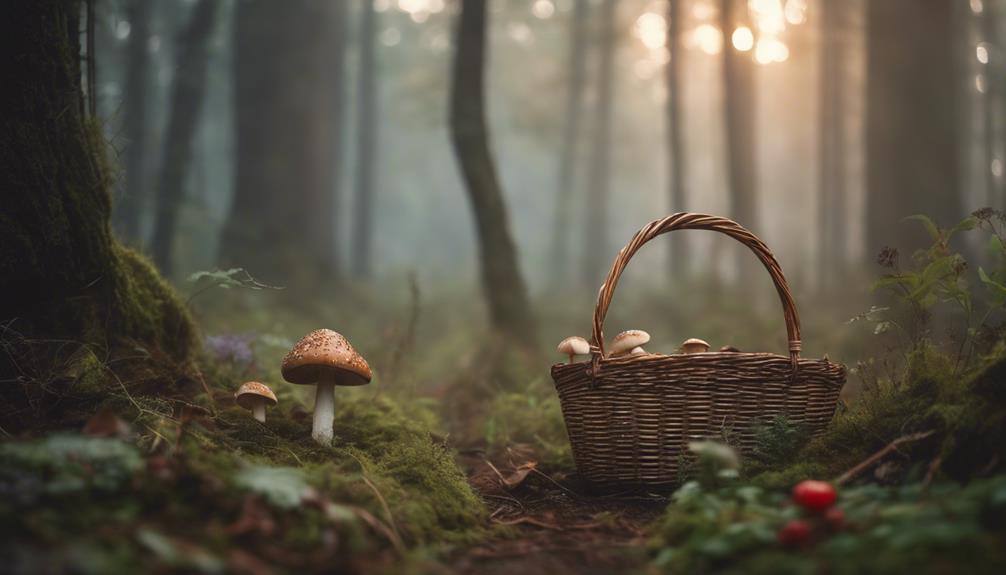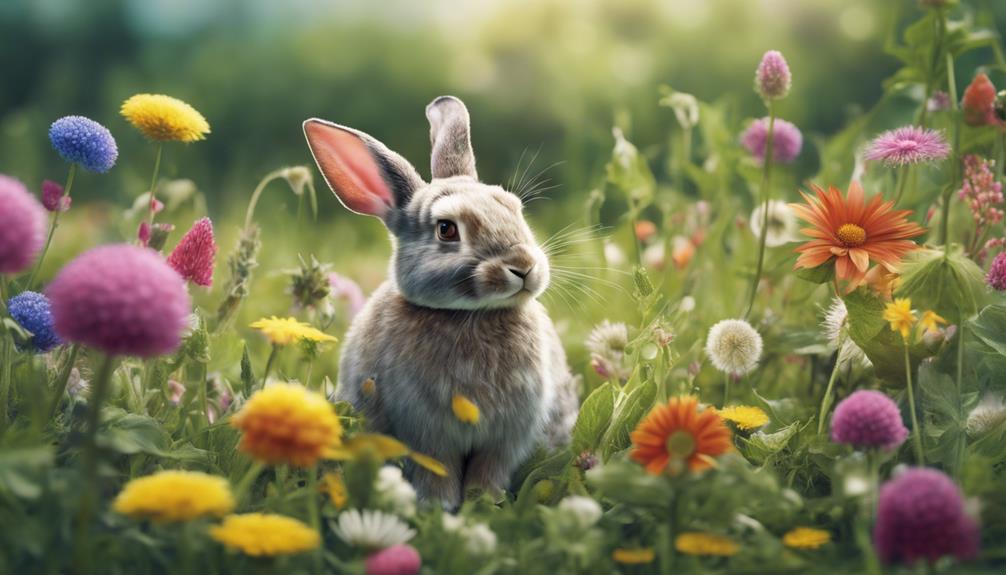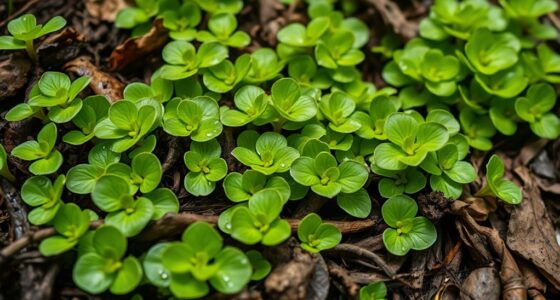By foraging, you're not only uncovering a treasure trove of nutritious wild edibles, but also embracing a practice that fosters a deeper connection with nature, supports biodiversity, and promotes sustainable food systems. You'll discover the importance of responsible harvesting, appreciate the interconnectedness of ecosystems, and support conservation efforts. Foraging also provides numerous health benefits, preserves cultural heritage, and builds stronger community bonds. As you explore the world of foraging, you'll find that it's a crucial part of a sustainable future, and there's much more to unearth.
Key Takeaways
- Foraging reconnects us with nature, fostering a deeper appreciation for local flora and promoting ecological stewardship and conservation.
- It promotes sustainable food practices, reducing our ecological footprint by gathering food locally and preserving wild plant populations for future generations.
- Foraging has numerous health benefits, providing essential vitamins, minerals, and antioxidants that enhance nutrient intake and overall well-being.
- It plays a crucial role in preserving cultural identity, intertwining with spiritual beliefs and community cohesion, and maintaining biodiversity and cultural diversity.
- By adopting responsible harvesting practices, foraging contributes to ecosystem health, supports local economies, and addresses environmental challenges.
Reconnecting With Nature's Bounty
As you venture into the world of foraging, you'll discover a sense of wonder and awe as you reconnect with the natural world, uncovering the hidden gems of edible and medicinal plants that grow in the most unexpected places.
By foraging, you'll reconnect with nature, fostering a deeper appreciation for the local flora that surrounds you. You'll develop a sense of respect for the natural resources that provide for you, and you'll begin to see the world in a new light.
As you explore the outdoors, you'll uncover the diverse plant species that thrive in your area, and you'll gain a deeper understanding of the local landscape. By adopting sustainable harvesting practices, you'll guarantee that these natural resources remain abundant for generations to come.
Through foraging, you'll not only reconnect with nature but also cultivate a sense of stewardship towards the environment, promoting a more harmonious relationship between humans and nature.
Understanding Ecosystems and Conservation

You'll soon discover that exploring foraging fosters a profound understanding of ecosystems, connecting you directly with the intricate web of relationships between plants, animals, and their environments.
As you investigate the natural world, you'll develop a deeper appreciation for the interconnectedness of ecosystems and the importance of preserving them. By adopting responsible foraging practices, you'll contribute to conservation efforts and support biodiversity.
You'll learn to identify and respect the habitats of various plant species, ensuring their populations remain healthy and thriving. This awareness of ecological interactions and species diversity will enhance your understanding of ecosystems, allowing you to make informed decisions that promote conservation.
Promoting Sustainable Food Practices

By embracing foraging, you're not only nourishing your body with wild, wholesome foods, but also adopting a sustainable food practice that resonates in harmony with the environment. This approach promotes a minimal environmental impact, as you're utilizing natural resources without depleting them. By foraging, you're taking only what you need, reducing your reliance on mass-produced foods that often have high ecological footprints.
Here are some benefits of promoting sustainable food practices through foraging:
- You'll reduce your carbon footprint by gathering food locally, without relying on industrial farming and transportation.
- You'll connect with nature, appreciating the abundance of edible plants available in the wild.
- You'll promote the preservation of wild plant populations, ensuring their survival for future generations.
- You'll adopt a healthier relationship with food sourcing, valuing the effort and resources that go into producing your meals.
- You'll contribute to a more sustainable food system, one that prioritizes harmony with the environment over profit and convenience.
Foraging Ethics and Responsible Harvesting

When you forage, prioritizing sustainable harvesting practices that safeguard the well-being of plant communities and ecosystems is critical. This means adopting responsible harvesting methods that guarantee the long-term health of the environment.
As a forager, it's important to develop a deep understanding of plant identification, taking care not to confuse edible species with lookalikes. You should only take what you need, leaving enough for other foragers and to maintain the ecosystem's balance.
It's also important to respect local regulations, be mindful of fragile habitats, and avoid overharvesting, which can lead to the depletion of plant populations. By following these guidelines, you'll not only ensure the preservation of natural areas but also promote environmental stewardship and conservation of wild resources.
Health Benefits of Wild Foods

As you explore the world of foraging, you'll discover that wild foods offer a wealth of health benefits. Not only do they provide nutrient-dense food options, but they also boost your immune system and are rich in antioxidants.
Nutrient-Dense Food Options
Incorporating wild foods in your diet can greatly enhance your nutrient intake, thanks to their exceptional density in vitamins, minerals, and antioxidants. Foraging offers a natural and healthy alternative to processed and commercially grown foods, providing a diverse range of health benefits. By including wild foods in your diet, you can boost your immunity, improve digestion, and support overall well-being.
Here are just a few examples of the nutrient-dense food options you can forage:
- Wild greens like dandelion and purslane, packed with vitamins A, C, and K
- Berries like wild blueberries and raspberries, rich in antioxidants and fiber
- Mushrooms like chanterelles and oyster mushrooms, high in protein and minerals
- Seaweed like kelp and dulse, rich in iodine and other essential minerals
- Wild herbs like chamomile and lemon balm, offering calming and anti-inflammatory properties
Boosts Immune System
You can supercharge your immune system by consuming wild foods, which are packed with nutrients and phytochemicals that help fight off infections and illnesses.
Foraging for wild edibles can be a game-changer for your health, especially when it comes to boosting your immune system. Wild foods are rich in vitamins, minerals, and antioxidants that support a healthy immune system.
Phytochemicals in foraged foods can help fight inflammation and boost immune defenses. By incorporating a variety of wild foods into your diet, you can enhance your body's natural ability to ward off infections and illnesses.
Certain wild plants like elderberry and echinacea are known for their immune-boosting properties and are commonly foraged for their health benefits. By making wild foods a part of your diet, you can contribute to overall wellness and strengthen your body's immune response.
Rich in Antioxidants
Foraging for wild edibles not only boosts your immune system, but it also provides a rich source of antioxidants that help protect your body against free radicals and oxidative stress. By incorporating wild foods into your diet, you'll reap the benefits of their high antioxidant content. You'll be amazed at the difference it can make in your overall health and well-being.
Here are just a few reasons why foraging for wild foods rich in antioxidants is a game-changer:
- Wild berries like blueberries, raspberries, and strawberries are packed with antioxidants that help reduce inflammation and improve heart health.
- Leafy greens like dandelion, chicory, and plantain contain high levels of antioxidants that support immune function and overall health.
- Foraging for wild mushrooms like chanterelles and oyster mushrooms provides a rich source of antioxidants that help protect against oxidative stress.
- Wild herbs like rosemary, thyme, and oregano are rich in antioxidants that help reduce inflammation and improve cognitive function.
- Incorporating a variety of wild foods into your diet ensures you're getting a diverse range of antioxidants to promote excellent health and well-being.
Cultural Significance and Traditions

As indigenous communities have long recognized, their traditional foraging practices are deeply rooted in cultural heritage, where the land, spirituality, and community are intricately woven together.
You'll find that foraging holds deep cultural significance as a traditional practice passed down through generations in many indigenous communities. These communities have developed ancestral knowledge of plants, ecosystems, and sustainable harvesting practices, which are essential to their cultural identity.
Foraging traditions are intertwined with spiritual beliefs, rituals, and community cohesion, providing a sense of belonging and connection to the land. By preserving these foraging traditions, you're helping to maintain biodiversity, ecological balance, and cultural diversity.
As you engage in foraging, you're promoting a connection with the land, history, and ancestral knowledge of local environments. By embracing these cultural traditions, you'll gain a deeper appreciation for the natural world and the people who've lived in harmony with it for centuries.
Ecological and Socioeconomic Advantages

As you explore the ecological and socioeconomic advantages of foraging, you'll discover how it contributes to biodiversity conservation efforts. It supports local food systems and provides economic incentives.
Biodiversity Conservation Efforts
You can play an essential role in preserving local ecosystems by adopting sustainable foraging practices that support native species and combat invasive plants. By doing so, you'll contribute to biodiversity conservation efforts and promote ecological stewardship. Sustainable foraging practices not only support local economies but also strengthen communities through economic opportunities and cultural preservation.
Here are some ways foraging supports biodiversity conservation efforts:
- Preserves native species: By foraging invasive plants, you create space for native species to thrive, maintaining ecological balance.
- Combats invasive species: Foraging invasive plants in metropolitan areas generates socioeconomic and cultural value while preserving native species.
- Supports local economies: Sustainable foraging practices contribute to local economies, fostering economic opportunities and community growth.
- Fosters ecological stewardship: Foraging promotes ecological stewardship, encouraging responsible land management and ecosystem health.
- Promotes ecosystem health: By adopting sustainable foraging practices, you address environmental challenges, promote biodiversity, and foster ecosystem health.
Local Food Systems
By embracing local food systems, you'll not only savor the flavors of your region but also reap a multitude of ecological and socioeconomic benefits. Local food systems promote biodiversity, support ecosystem health, and reduce carbon emissions by minimizing transportation.
By foraging locally, you'll reduce your environmental impact, support small-scale farmers, and preserve traditional food knowledge. Sustainable foraging practices contribute to local economies, create jobs, and strengthen community ties.
Moreover, local food systems enhance food security, resilience to climate change, and cultural diversity by valuing indigenous food traditions. By choosing local, you'll combat food insecurity, enjoy nutrient-rich options, and reduce reliance on conventional agriculture.
Economic Incentives
Foraging initiatives can generate significant economic incentives, from creating jobs and stimulating local economies to promoting ecological balance and socioeconomic growth. By supporting local foraging initiatives, you're not only contributing to the conservation of biodiversity but also boosting the local economy. This, in turn, creates a ripple effect, stimulating socioeconomic value and promoting ecological balance.
Here are just a few ways foraging can benefit your community:
- Job creation: Foraging initiatives can create new job opportunities, from foraging guides to sustainable harvesting practices.
- Local economy stimulation: By promoting local foraging, you're keeping money within the community, supporting local businesses and stimulating economic growth.
- Ecological balance: Sustainable foraging practices support ecological balance, promoting biodiversity and combating invasive species.
- Cultural value: Foraging can foster connections within communities, strengthening networks and promoting shared knowledge and initiatives.
- Environmental benefits: Foraging offers an opportunity to address environmental challenges and promote ecosystem health.
Building Communities Through Foraging

Through collaborative foraging efforts, communities come together, weaving a tapestry of shared knowledge, resources, and values that strengthen social bonds and foster a deeper connection to the land.
As you participate in community foraging events, you'll notice how sharing knowledge and resources builds strong bonds within the community. You'll collaborate with others, promoting sustainability and unity, and fostering a sense of belonging and connection to the land and each other.
When you share foraged foods, you'll create a sense of abundance and generosity among community members, further strengthening social ties. Community foraging initiatives also support local economies, biodiversity, and environmental conservation, making it a valuable activity for the community as a whole.
The Future of Sustainable Foraging

What role will you play in shaping the future of sustainable foraging, where every harvest has the potential to either harm or heal the environment? As you venture into the world of sustainable foraging, you become an integral part of maintaining ecological balance and promoting community well-being. Your responsible harvesting practices can make a significant difference in preserving native plant populations and combating invasive species.
Here are just a few ways you can contribute to a sustainable foraging future:
- Preserve biodiversity: By choosing to forage for wild edibles, you're supporting the conservation of local ecosystems.
- Combat invasive species: Your foraging efforts can help eradicate invasive species, making room for native plants to thrive.
- Support ecosystem health: Sustainable foraging practices promote ecological balance, ensuring the long-term health of our planet.
- Foster community connections: Foraging brings people together, building stronger, more environmentally conscious communities.
- Protect the environment: Every responsible harvesting practice you adopt helps mitigate the environmental challenges we face today.
Preserving Ancient Practices and Knowledge

As you explore the world of foraging, you're not only gathering wild edibles, but also uncovering a treasure trove of ancient knowledge and practices that have been passed down through generations.
Preserving ancient practices and knowledge is a crucial aspect of foraging, as it allows you to tap into the collective wisdom of indigenous communities. These communities hold valuable Traditional Ecological Knowledge related to foraging, which has been refined over centuries. By adopting these practices, you'll gain a deep understanding of the natural environment and plant uses, just like traditional foragers.
Preserving indigenous foraging practices helps maintain essential ecological knowledge and cultural diversity, which is fundamental for the well-being of our planet. Foraging is integral to cultural traditions and spiritual practices, connecting people with nature. By embracing these ancient practices, you'll not only become a skilled forager but also contribute to the preservation of our cultural heritage.
Frequently Asked Questions
What Is the Significance of Foragers?
You recognize that foragers are essential in preserving traditional ecological knowledge, promoting sustainable harvesting, and building a deeper connection with nature, ultimately contributing to biodiversity conservation and ethical food sourcing.
Why Is Optimal Foraging Important?
As you venture into the wild, you'll find that essential foraging is vital, allowing you to grasp how animals strike a balance between energy gain and foraging costs, ultimately shaping their survival and adaptation strategies.
What Is Foraging and Why Is It Important?
You're about to uncover the basics of foraging! It's the act of searching for and gathering wild food resources like plants, fruits, and nuts in natural environments, and it's essential because it connects you with nature and promotes sustainable food practices.
What Does Foraging Mean in World History?
As you explore the annals of time, you'll find that foraging is the unsung hero of world history, weaving a rich tapestry of cultural exchange, societal development, and environmental stewardship that has shaped human civilization as it is understood.
Conclusion
As you explore the world of foraging, you'll discover a deeper connection to nature and a more sustainable approach to food. Foraging allows individuals to harvest wild, edible plants and fungi while fostering an appreciation for the natural ecosystems that sustain us. Unlike conventional farming or industrial food production, foraging leaves a smaller environmental footprint and promotes biodiversity. Interestingly, in some simulations or games, how mining speed impacts foraging depends on resource availability and tool efficiency, serving as a reminder of the intricate balance between human activity and nature’s rhythms. Furthermore, successful foraging requires an awareness of seasonal cycles and an understanding of which plants and fungi are safe to consume. The mining speed and foraging link highlights how even slight changes in techniques or tools can significantly affect the sustainability of resource gathering, both in real life and digital realms. By respecting the delicate balance of ecosystems, foragers can ensure that they minimize their impact while reaping nature’s abundant rewards.
Take, for instance, the city of Copenhagen, where urban foraging initiatives have transformed abandoned lots into thriving wild food gardens, providing fresh produce to local communities.
By embracing foraging, you'll not only enrich your palate but also contribute to a more environmentally conscious food system, preserving ancient practices and fostering a sense of community.










